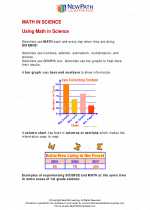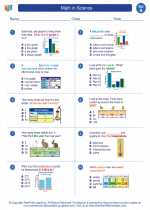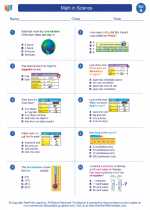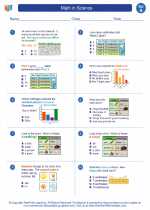What is Mathematics?
Mathematics is the study of numbers, quantities, shapes, and patterns. It is a fundamental part of human knowledge and is used in various fields such as science, engineering, economics, and everyday life.
Key Concepts in Mathematics
- Number Systems: Understanding whole numbers, fractions, decimals, and integers.
- Basic Operations: Addition, subtraction, multiplication, and division.
- Geometry: Study of shapes, sizes, and properties of space.
- Algebra: Using symbols and letters to represent numbers and quantities.
- Measurement: Understanding units of measurement and conversions.
- Probability and Statistics: Analyzing data and making predictions based on probability.
Study Guide for Mathematics
Here are some tips for studying mathematics effectively:
- Practice Regularly: Mathematics requires constant practice to master concepts and problem-solving skills.
- Understand the Basics: Build a strong foundation by understanding fundamental concepts such as addition, subtraction, multiplication, and division.
- Use Visual Aids: Visual representations such as diagrams and charts can help in understanding geometric and algebraic concepts.
- Solve Problems: Regularly solve mathematical problems to apply theoretical knowledge and improve problem-solving abilities.
- Seek Help: If you're having difficulty understanding a concept, don't hesitate to seek help from teachers, tutors, or online resources.
Importance of Mathematics
Mathematics is essential for various reasons:
- It helps in developing critical thinking and analytical skills.
- It is crucial for understanding and solving real-world problems in fields such as science, engineering, and finance.
- Mathematics provides a universal language for communication and understanding of quantitative information.
- It is a fundamental skill required for many professions and everyday activities.
Overall, mathematics is a fundamental and essential discipline that plays a crucial role in various aspects of our lives.
.◂Science Worksheets and Study Guides First Grade. Math in Science
Study Guide Math in Science - 1st grade level
Math in Science - 1st grade level  Worksheet/Answer key
Worksheet/Answer key Math in Science - 1st grade level
Math in Science - 1st grade level  Worksheet/Answer key
Worksheet/Answer key Math in Science - 1st grade level
Math in Science - 1st grade level  Worksheet/Answer key
Worksheet/Answer key Math in Science - 1st grade level
Math in Science - 1st grade level 

 Worksheet/Answer key
Worksheet/Answer key
 Worksheet/Answer key
Worksheet/Answer key
 Worksheet/Answer key
Worksheet/Answer key

The resources above cover the following skills:
EARTH AND SPACE SCIENCE
Earth’s Place in the Universe
Observe seasonal patterns of sunrise and sunset to describe the relationship between the number of hours of daylight and the time of year (e.g., more hours of daylight during summer as compared to winter).